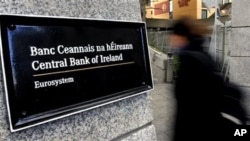European leaders have welcomed Ireland's request for a bailout package from the European Union and the International Monetary Fund. The Irish government applied for the bailout Sunday to help salvage its economy.
Spain's Foreign Affairs Minister Trinidad Jimenez said Monday that Ireland's decision to accept a bailout is good news. She said European Union solidarity has worked and the euro will be stable once again because of the help of all the countries within the European Union.
The Irish government had denied for weeks that it would need a rescue package to help salvage its economy. But after an emergency meeting Sunday night, the country's Taoiseach, or prime minister, said Ireland had requested financial help.
The total amount has yet to be agreed, but it's estimated to be worth around $100 billion - slightly less than a similar package loaned to Greece earlier this year.
Austrian Foreign Affairs Minister Michael Spindelegger said the bailout would stop contagion spreading to other weak economies within the euro zone.
"If you have a look at the euro and the stability of the euro of course this was the right way to proceed," Spindelegger said.
Ireland is mired in debt because the government had to bail out the country's main banks, a move that cost $60 billion and drove the 2010 deficit to 32 percent of GDP.
Sam Bowman of the free market research group Adam Smith Institute, said the rescue package is a mistake.
"The problem is that the Irish banks borrowed recklessly and funded a property bubble that has now burst. And what we are doing in this bailout is paying off people who lent to the Irish banks to try to prevent them from making losses," Bowman said. "And what is going to happen is that the Irish taxpayer is going to have to pay back those debts. So really what we're doing is transferring the debt from the people who lent to the banks to the Irish tax payer and that's really not fair and it's really very bad for the Irish economy."
Measures to boost Irish government revenue will be part of the loan deal. One likely option is raising Ireland's corporate tax - Bowman said that would weaken the country's economy.
"[The] European Union is proposing that Ireland raises taxes, particularly corporation tax, which is the way Ireland has managed to grow over the last 20 years, is by attracting foreign investment, companies like Facebook, Google, Hewlett Packard, other drugs companies etcetera through a low corporation tax rate and forcing Ireland to raise its corporation tax rate is really going to mean that it's losing all chance of recovery and I think it's an extremely, extremely bad step," Bowman said.
The EU Commissioner for Economic and Monetary Affairs said Monday details of the loan agreement may not be finalized until the end of the month.
Related video report bu Mil Arcega:




